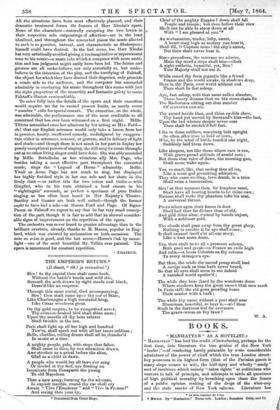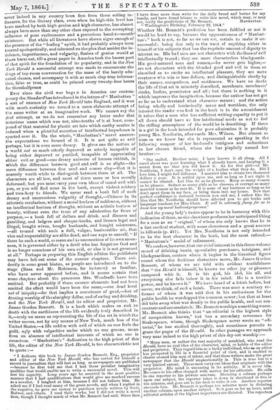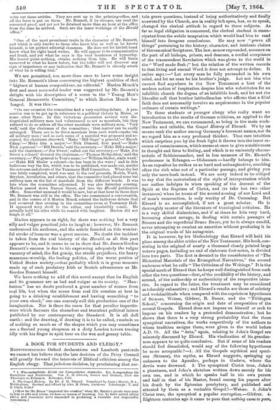BOOKS.
" MANHATTAN " AS A NOVELIST4 " MANHATTAN " has had the credit of introducing, perhaps for the first time, into literature the true genius of the New York "loafer ;"—of rendering barely palatable by some considerable admixture of the power of chaff which the true London street- boy possesses in its highest form (that of the Parisian gamin is many steps nearer to wit), the half-tipsy and wholly " seedy " sort of insolence which merely "takes sights" at politicians who venture to talk of principle, and attempts to settle all questions of high political morality by breathing upon them the fumes of a public opinion reeking of the dregs of the wine-cup and the stale smoke of New York saloons. Literature has
* Jo ads content de you& .1- Marion By "Manhattan." Three vols. London : Saunders °Rey, and Co never indeed in any country been free from these soiling in- fluences, for the literary class, even when its high-tide level has been marked by both high genius and high character, has almost always been more than any other class exposed to the corrupting influence of poor excitements and a precarious hand-to-mouth, existence. But while all literatures have shown signs enough of the presence of the " loafing " spirit, it had probably always been treated apologetically, and tolerated on the plea that amidst the in- dolence, impertinence, and vulgarity, flashes of genius would at times burst out, till a great paper in America took the basest part of that spirit for the foundation of its popularity, and in the New York Herald a successful attempt was made to concentrate the dregs of tap-room conversation for the mass of the barely edu- cated classes, and accompany it with as much clap-trap informa- tion, false or true, as could be printed every twenty-four hours
for threehalfpence Ever since the civil war begs n in America our contem-
porary the Standardhas introduced in the letters of" Manhattan" a sort of essence of New York Herald into England, and it was with much curiosity we turned to a more elaborate attempt of the same writer at an imaginative work. We cannot say the first attempt, as we do not remember any letter under that notorious name which was not, nine-tenths of it at least, com-
posed of that material for plastic art into which earthy matter is reduced when a plentiful secretion of intellectual impudence is spurted over it. On the whole, " Manhattan's " novel answers the expectations we formed of it. It is not quite so evil perhaps, but it is even more dreary. It gives one the notion of
a world not so much utterly depraved as utterly incapable of being either depraved or purified, incapable of appreciating either evil or good—one dreary universe of human rubbish, in which the difference between good and evil is so slight—the mere difference between fine mud and coarse clay—that it is scarcely worth while to distinguish between them at all. The
characters are all low, and most of them more or less morally deformed; but you must carry your own ideas of moral evil with you, or you will find none in the book, except violent robbery and treachery to friends. We never read a book full of such dreary and unconscious vulgarity of thought,—Chinese in its atheistic secularism, without a moral horizon of nobleness, without an intellectual horizon of thought, without an artistic horizon of beauty, without even the trace of any admiration for force of purpose, — a book full of dollars and drink, and dinners and gambling, and ledgers and cheque-books, and licence legal and illegal, bought wives, bought husbands, and bought mistresses, —all treated with such a dull, vulgar, businesslike air, that vice and respectability are alike dead, and one says to oneself, "If there be such a world, so mean and so unconscious of its own mean- ness, it is governed either by a devil who has forgotten God and is no longer conscious of his own evil, or else it is not governed at all." Perhaps in preparing this English edition the publishers may have left out some of the coarser chapters. There evi- dently is some great hiatus, as people are introduced on to the stage (Rosa and Mr. Robinson, for instance) as familiar, who have never appeared before, and it seems certain that some chapters about the procuress Mrs. Woodruffe have been omitted. But probably if these coarser elements had not been omitted the effect would have been the satne,—one dead level
not of iniquity—for that implies a conscience of good,—but of droning worship of the almighty dollar, and of eating and drinking, and the New York Serail, and its editor and proprietor, Mr. James Gordon Bennett. It is a book which makes us sick to
death with the earthiness of the life evidently truly described in it,—truly we mean as representing the life of the set in which the writer moves, not by any means of New York, much less of the United States,—a life sodden with evil of which no one feels the guilt, ugly with vulgarities under which no one groans, mean from an absence of intellectual interests of which no one is conscious. " Manhattan's " dedication to the high priest of this
life, the editor of the New York Herald, is too characteristic not to quote :— " I dedicate this book to James Gordon Bennett, Esq., proprietor and editor of the New York Herald, who has carved for himself a record in journalism that will last as long as-newspapers are published —because he first told me that I had those peculiar imaginative qualities that would enable me to write a successful novel. This will test his sagacity. Long years ago he asserted in the most positive manner that I had qualifications that would give me marked success as a novelist I laughed at him, because I did not believe him. He asked me if I had read many of the great novels, and when I replied in the negative, he gave me money to purchase novels written by Scott, Bulwer, and others. I read their works, but I did not write a novel then, though I thought much of what Mr. Bennett had said. Since then I have done more than write for the daily bread and butter for my family, and have found leisure to write this novel, which may, or may not, verify the predictions of Mr. Bennett. MANHATTAN. "Washington's Birthday, February 22, 1864."
Whether Mr. Bennett's prediction has been fulfilled or not it would be hard to say, because the oppressiveness of " Manhat- tan's " book is not, so far as we can see, certain to make it un- successful; being due only to the want of anything either in himself or his subjects that has the requisite amount of dignity to interest us. His bad men are not characters with the lines of evil intellectually traced ; they are mere characterless blackguards. His good-natured men and women,—he never gets higher,— are not characters with the blended good and evil in them so classified as to excite an intellectual pleasure, they are mere creatures who win or lose dollars, and distinguishable chiefly by their names, occupations, and residences. We have no doubt the life of that set is minutely described, merchants, merchants' clerks, loafers, prostitutes and all ; but there is nothing in it which impresses the imagination, because the author has not got so far as to understand what character means; and the action being wholly and intrinsically mean and worthless, the only interest the reader cm find in the book is in the astonishment it raises that a man who has sufficient writing capacity to put it all down should have so few intellectual needs as not to feel the stifling atmosphere of the world be is describing. If there is a girl in the book intended for pare admiration it is probably young Mrs. Nordheim, afterwards Mrs. Wilson. But almost as soon as we know her site is represented as speaking in the following tamper of her husband's intrigues and seductions to her chosen friend, whom she has playfully named her brother :— " Sho smiled. Brother mine, I have known it all along. All I cared about was your learning what I already knew, and keeping it a secret from me that you did know it. As for that girl—or Mr. Nordheim, I don't care the weight of a feather what they do. Did I love him, I might feel different. I married him to obtain two thousand dollars a year. It is settled upon me, and as long as I act right it cannot be altered. Let him do as he pleases. Keep as many women as he pleases. Seduce as many girls as he chooses, or corrupt as many married women as he sees fit. It is none of my business so long as he don't sport them in my face, or bring them into my house. Now that perfect confidence is restored between you and me, I rather like the idea that Mr. Nordheim should have selected you to get books and language teachers for Miss Clara. It will be extremely funny for us to know how my moral husband progresses."
And the young lady's tastes appear to be in harmony with this indication of them, as she elsewhere professes her anticipated liking . for a man as an "original," of whom she only knows that he is a fast medical student, with some cleverness and a great success in billiards (p. 217). Yet Mrs. Nordheim is not only intended to be the best character in the book, but the most refined,— " Manhattan's " model of refinement.
We confess, however, that our chief interest in this three-volume record of drinking bouts, speculative purchases, intrigues, and blackguardism, centres where it begins in the historical figure round whom the fictitious characters move, Mr. James Gordon Bennett, of whom we are told with evident truthfulness that " the Herald is himself, he knows no other joy or pleasure compared with it. It is his god, his idol, his all, and everything else falls below it in his mind. He is a terrible power, and he knows it." We have heard of a fetish before, but never, we think, of such a fetish. There was once a sanitary re- former of whom it was said that in his enthusiasm for the public health he worshipped the common sewer ; but that at least did take away what was deadly to the public health, and not con- centrate and accumulate it. Mr. Bennett worships something worse. Mr. Bennett also thinks that " an editorial is the highest style of composition known," but has a secondary reverence for Shakespeare, whom, though Shakespeare never wrote an "edi- torial," he has studied thoroughly, and sometimes permits to grace the pages of the Herald. In other passages we approach very near indeed to the high priest of this dry-rot worship :— " Many men, or rather the vast majority of mankind, who read the Herald have no real idea of the character, mind, or habits of the editor and proprietor. They regard him as a lucky individual, who as an editor has prospered in life in a financial point of view, and is enabled to cluster around him men of talent, and that these writers make the great newspaper that the Herald unquestionably is. This is true but to a very limited extent. Those men carry out ideas that originate with the proprietor. His mind is unceasing in its activity.It is never idle. Ile comes to his office charged with matter for his editorials. He calls in one reporter to his private sanctum. Dictating a column perhaps upon one subject, the reporter takes it down in shorthand in five or ten minutes, and goes out to his desk to write it out. Another reporter succeeds him. Mr. Bennett is perhaps ten minutes more in dictating another column, upon another subject. So it goes on for an hour, until editorial articles of the highest importance are dictated. The reporters
write out these articles. They are sent up to the printing-office, and all the force is put on them. Mr. Bennett, if he chooses, can read the corrected proof, and yet not be detained more than an hour at the office from the time he arrived. Such are the inner workings of the Herald office."
• • • • • "One of the most prominent traits in the character of Mr. Bennett, and which is only known to those who know him as well as he knows himself, is his perfect editorial closeness. He does not let his left hand know what his right hand writes. He will appear to be communicative and frank, and yet what he says is the very frankness of hypocrisy. His hearer gains nothing, obtains nothing from him. He will listen unmoved to what he knew before, but the teller will not discover any sign of impatience or any indication that Mr. Bennett is already aware of what he is telling him."
We are permitted, too, more than once to have some insight into Mr. Bennett's ideas concerning the highest qualities of that "highest of human compositions, an editorial." Marion Monck's first and most successful leader was suggested by Mr. Bennett's delight with his description of a scene in the "Young Men's General Democratic Committee," to which Marion Monck be- longed. It was this :—
" On one occasion the committee had a very exciting debate. A pro- cession was to be got up in reference to a political victory in Maine, or some other State. In this victorious procession several very dis- tinguished military men had volunteered to act as marshals, but they refused to -do so unless all the other marshals were military men. Very well,' said the chairman of the committee ; that matter can be easily arranged. There are to be three marshals from each ward—make 'em all military men ;' and as each name of a marshal was proposed and ac- cepted, the chairman observed, Make "Bill Gage" a general.'—' Enoch Camp.'—' Make him a major.'—' Nick Dimond, first ivard.'—' Make Nick a general.'-4 Bill Dennis,' said the secretary.—' Make Bills major,' said the chairman.—' Joe Sweet,' called out the secretary.—' Make Joe Sweet a colonel,' dictated the chairman.—' Thomas McSpeddon' ' said the secretary.—' Put general to Tom's name.'—' William Shaler, sixth ward.'
Make Bill Shaler a colonel—he has been in the wars ;' and in this ludicrous way the list, which was to be published, was made out, amidst the screams and shouts of the Tammany Hall Committee. When the list was fairly completed, word was sent to the real generals, Morris, Ward, Stryker, Arculariva, and others, that the committee had placed none but military men on the list of marshals from the different wards. It was late when the committee adjourned. It was also Saturday evening. Marion passed down Nassau Street, and into the Herald publication office. Somewhat unusual it would be now, but at that hour in those days Mr. Bennett was still in the office. The two commenced a conversation, and in the course of it Marion Monck related the ludicrous debate that had occurred that evening in the committee-room at Tammany Hall. It appeared very droll to the editor, and irresistibly comic. He actually held his sides while he roared with laughter. Marion did not laugh at all."
Marion appears to us right, for there was nothing but a very silly and vulgar practical joke to laugh at; however, Mr. Bennett understood his audience, and the article founded on this wonder- ful stroke of humour was a great success. No doubt the incident is taken from the real history of the Herald, as all this part appears to be, and it seems to us to show that Mr. James Gordon Bennett's success is due to his expressing adequately the vulgar vacancy of mind, the flat gossip, the sterile prejudices, the heavy mammon-worship, the loafing politics, of the worst portion of United States society,—that probably which is in great measure made up of such predatory Irish or Scotch adventurers as Mr. Gordon Bennett himself.
We have nothing to add of this novel except that its English and its grammar are as bad and vulgar as its society. "Man- hattan " has no doubt produced a great number of scenes from real life, but when the scene from real life consists at best in going to a drinking establishment and having something "to your own cheek," one can scarcely call this production one of the imagination. Nor is there the room for that peculiar impertin- ence which flavours the shameless and truculent political letters published by our contemporary the Standard. It is all dull earth : and the drawing, if drawing it is to be called, reminds us of nothing so much as of the shapes which you may sometimes see a flushed young shopman at a dirty London tavern tracing idly with his finger in spilt beer on the wet and greasy table.
































 Previous page
Previous page